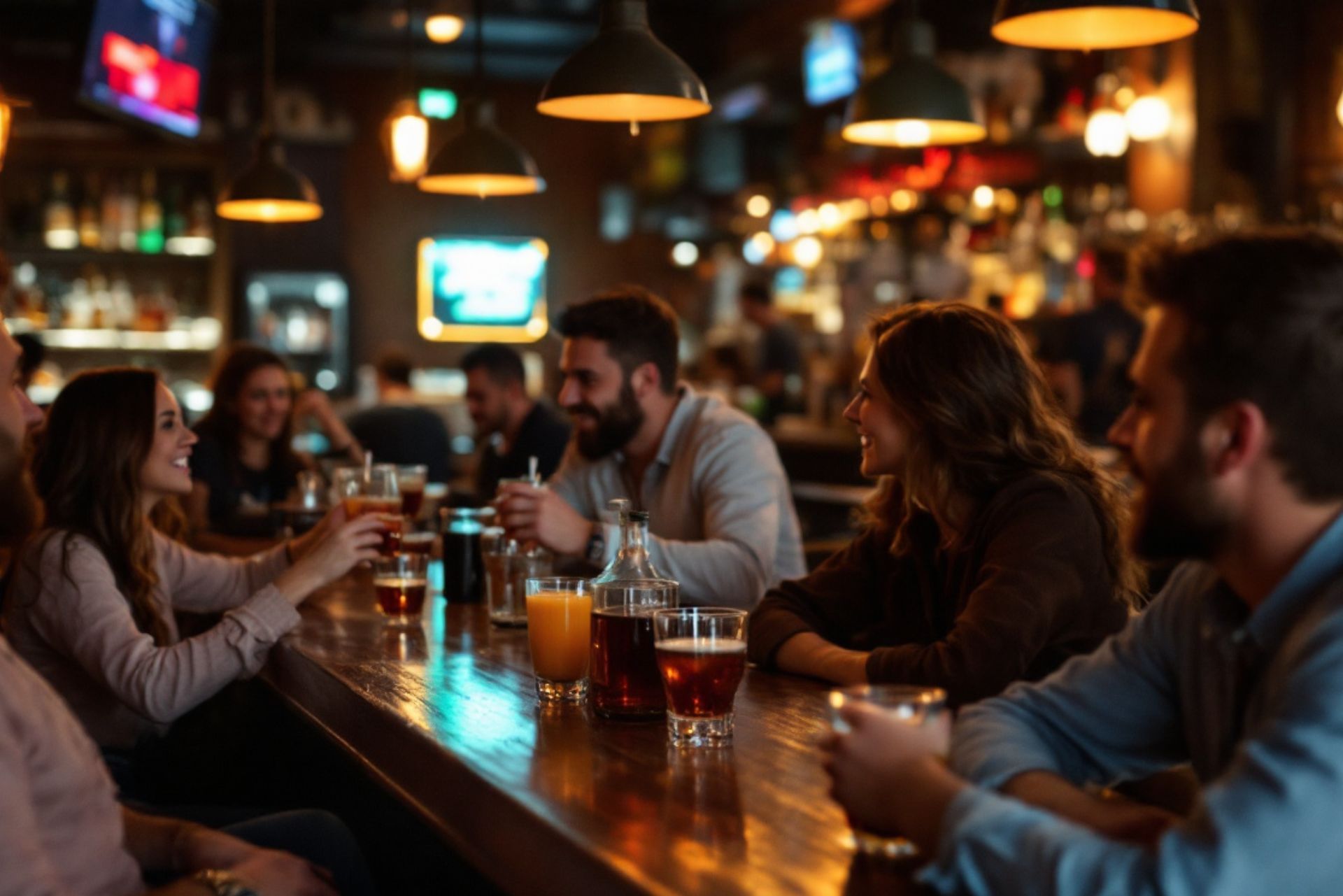
We're an independent insurance agency in Texas
Our experienced team offers services for both residential and commercial properties.With over 25 years of experience in the industry.
Contact Us
6600 Lyndon B Johnson Fwy Ste 220, Dallas, TX 75240, United States
(214) 253-0570
quotes@thephoenixinsurance.com
Working Hrs : 9.30am to 5.30pm
Texas Liquor Liability Insurance

See How We're Different:
or Call Us: (214) 253-0570

Most Common Business Policies
Index
Understanding Liquor Liability Insurance
Texas State Laws on Liquor Liability
Key Features of Texas Liquor Liability Insurance
Cost of Liquor Liability Insurance in Texas
Choosing the Right Liquor Liability Insurance Provider
Filing a Liquor Liability Insurance Claim in Texas
Frequently Asked Questions about Texas Liquor Liability Insurance
Contact Us
For many businesses in Texas, especially those that serve alcohol, understanding liquor liability insurance is crucial. This guide provides a comprehensive overview of what liquor liability insurance is, how it operates within Texas law, its key features, associated costs, and tips for selecting the right provider. Whether you own a bar, restaurant, or event venue, being informed can protect you from potential financial risks.
Understanding Liquor Liability Insurance
Liquor liability insurance is designed to protect businesses that sell or serve alcohol from legal and financial consequences that arise from intoxicated patrons. This coverage can be integral in safeguarding a business against claims that result from accidents or injuries caused by an intoxicated individual.
Definition and Importance of Liquor Liability Insurance
Liquor liability insurance typically covers legal fees, settlements, and other expenses that may arise when a business is held liable for incidents caused by its patrons' intoxication. This may include third-party claims for bodily injury, property damage, or even wrongful death. The importance of this insurance cannot be overstated, as the financial ramifications of a liquor-related incident can be devastating.
In Texas, businesses are encouraged to obtain this coverage not just for legal protection, but also for peace of mind. Establishing a responsible atmosphere in a bar or restaurant allows owners and managers to focus on serving their patrons rather than worrying about the potential for lawsuits. Furthermore, having liquor liability insurance can enhance a business's reputation, as it demonstrates a commitment to responsible service and customer safety, which can attract a more conscientious clientele.
How Liquor Liability Insurance Works
This type of insurance works by providing a safety net for businesses when they are accused of serving alcohol irresponsibly. For instance, if a patron leaves a bar and gets into a car accident, the bar could be held liable if it is proven that the patron was over-served. In such cases, liquor liability insurance would cover the legal fees and damages associated with the incident.
It is important for business owners to understand that liquor liability insurance does not cover all incidents associated with alcohol service, but it can significantly mitigate risks associated with operating a business that serves alcoholic beverages. Additionally, many insurance providers offer risk management resources and training programs to help business owners and their staff recognize the signs of intoxication and implement responsible serving practices. This proactive approach not only helps in reducing the likelihood of incidents but also fosters a safer environment for both patrons and employees.

Texas State Laws on Liquor Liability
In Texas, liquor liability laws are specific and important for businesses to understand. The state has particular guidelines that govern the sale and serving of alcohol, and being aware of these can help in preventing liability issues.
Texas Dram Shop Laws
Dram Shop Laws in Texas allow individuals to sue establishments that serve alcohol if they are able to prove negligence in serving an intoxicated person. This means if a bar serves an obviously intoxicated patron who subsequently injures someone, the bar can be held liable.
These laws emphasize the responsibility of businesses to monitor their patrons’ alcohol consumption and take appropriate measures to prevent over-serving, highlighting the importance of training staff and having appropriate policies in place. Establishments are encouraged to implement comprehensive training programs for their employees that cover not only the legal aspects of serving alcohol but also practical skills in recognizing signs of intoxication. This proactive approach can significantly reduce the risk of incidents that could lead to liability claims.
Texas Happy Hour Laws
Texas has specific regulations regarding happy hour promotions to prevent irresponsible alcohol serving practices. While bars and restaurants are allowed to offer drink specials, they must comply with certain guidelines to ensure safety and responsibility.
This includes not offering unlimited drinks for a fixed price, as this could encourage overconsumption. Understanding these rules is essential to ensure compliance and minimize liability risks. Additionally, establishments are encouraged to promote responsible drinking by offering non-alcoholic options and food alongside their drink specials. By creating an environment that fosters moderation, businesses can not only protect themselves legally but also contribute to the overall safety and well-being of their patrons. Engaging in community awareness campaigns about responsible drinking can further enhance a business's reputation and demonstrate a commitment to social responsibility.
Key Features of Texas Liquor Liability Insurance
When considering liquor liability insurance, it is vital to understand the various features that can significantly impact coverage and premium costs.
Coverage Scope and Limitations
The scope of liquor liability insurance generally covers incidents involving bodily injury and property damage caused by an intoxicated patron. However, coverage can vary widely among providers. Standard policies may cover legal fees, settlements, and damages; however, they often have limitations on specific types of claims.
Understanding these limitations is crucial, and business owners should consult with their insurance agents to clarify what is included in their policy and to ensure they have adequate coverage. Additionally, it is important to consider the geographical limits of the policy, as some insurers may restrict coverage to specific locations or events. For instance, if a business operates in multiple states or hosts events outside their primary location, they should confirm that their liquor liability insurance extends to these activities. This proactive approach can prevent unexpected gaps in coverage that could lead to significant financial liability.
Policy Exclusions to Consider
Every insurance policy has exclusions, and liquor liability insurance is no exception. Common exclusions may include incidents involving underage drinking, illegal drug use, or serving alcohol to visibly intoxicated individuals after a certain time frame.
Being aware of these exclusions can help business owners take preventative measures to manage risks more effectively and avoid scenarios that could lead to denied claims. For example, implementing strict identification checks at the point of sale can mitigate the risk of underage drinking, while staff training programs focused on responsible alcohol service can help prevent over-serving patrons. Furthermore, documenting these practices can not only enhance safety but also serve as evidence of due diligence should a claim arise. By fostering a culture of responsibility and awareness among employees, establishments can significantly reduce their exposure to potential liabilities and create a safer environment for all patrons.
Cost of Liquor Liability Insurance in Texas
The cost of liquor liability insurance in Texas can vary significantly based on several factors, including the size of the business, location, and claim history. Understanding these factors is essential for business owners who wish to budget for this necessary coverage. In Texas, where the nightlife is vibrant and the restaurant scene is booming, liquor liability insurance is not just a legal requirement but a crucial safeguard against potential financial losses arising from alcohol-related incidents.
Factors Influencing Insurance Premiums
Several key factors influence the cost of liquor liability insurance premiums in Texas:
- Type of Business: Different types of establishments, such as bars, restaurants, or nightclubs, may have varying risk levels and, thus, different premium costs. For instance, a nightclub that operates late into the night and serves a high volume of alcohol may face higher premiums compared to a family-friendly restaurant that serves alcohol in moderation.
- Business History: Businesses with a history of claims will generally pay higher premiums compared to those with clean records. Insurers often look at the frequency and severity of past claims, which can influence their perception of risk associated with a particular establishment.
- Location: Areas with higher crime rates or more incidents related to intoxication may face higher premiums due to increased risk. Urban areas with bustling nightlife may see more incidents, leading to higher costs for businesses operating in those regions.
Tips to Lower Your Insurance Costs
While liquor liability insurance can be a significant expense, there are ways to manage those costs effectively:
- Shop around and compare quotes from multiple insurance providers to find the best prices. Each insurer may assess risk differently, leading to varying quotes for the same coverage.
- Consider bundling various types of insurance to receive discounts from providers. Many insurers offer package deals that can help reduce overall costs while ensuring comprehensive coverage.
- Implement staff training programs focused on responsible alcohol service to potentially lower risk and premium costs. Training staff to recognize signs of intoxication and handle difficult situations can not only enhance safety but also demonstrate to insurers that your business is proactive about risk management.
Additionally, maintaining a solid relationship with your insurance agent can be beneficial. Regularly reviewing your policy and discussing any changes in your business operations can help ensure that you are not overpaying for coverage you no longer need. Furthermore, many insurers offer discounts for businesses that have implemented safety measures, such as security personnel or surveillance systems, which can further mitigate risk and lower premiums. Understanding the nuances of your policy and the potential for discounts can empower business owners to make informed decisions that protect their interests while managing costs effectively.

Choosing the Right Liquor Liability Insurance Provider
Selecting an insurance provider is a critical decision that warrants careful consideration. The right provider can make a significant difference in your coverage and overall experience as a policyholder. With the complexities of liquor liability insurance, it's essential to find a provider that not only meets your needs but also understands the unique challenges faced by businesses in the hospitality sector.
What to Look for in an Insurance Provider
When evaluating liquor liability insurance providers, consider the following:
- Reputation: Research potential providers for customer reviews and industry ratings. A provider with a solid reputation is more likely to deliver on their promises and provide reliable support during claims.
- Experience: Look for companies with a strong track record of serving the hospitality industry. Providers with specialized experience can offer tailored solutions that address the specific risks associated with serving alcohol.
- Customer Service: Ensure the provider offers responsive and accessible customer support for any queries or claims. A dedicated support team can make a significant difference, especially during stressful situations when you need assistance the most.
In addition to these factors, consider the provider's financial stability. An insurer's ability to pay claims is paramount, so reviewing their financial ratings from independent agencies can provide insight into their reliability. Furthermore, look for providers that offer educational resources or risk management tools, as these can help you better understand your coverage and mitigate potential risks.
Common Mistakes to Avoid When Choosing a Provider
Avoiding common pitfalls can save business owners time and money:
- Don’t solely focus on the price; prioritize coverage quality and provider reliability. The cheapest option may not always provide the necessary protection, leading to costly gaps in coverage down the line.
- Neglecting to read policy details can lead to unpleasant surprises regarding coverage limits and exclusions. Always take the time to thoroughly review the terms and conditions of your policy, and don’t hesitate to ask for clarification on any points that are unclear.
Another common mistake is overlooking the importance of endorsements or additional coverage options. Many businesses may require specific coverage for unique circumstances, such as special events or off-premises alcohol sales. Discussing your specific needs with potential providers can help ensure you secure the appropriate endorsements to protect your business fully. Additionally, consider the claims process—understanding how claims are handled and the average time for resolution can provide peace of mind when selecting a provider.
Filing a Liquor Liability Insurance Claim in Texas
If your establishment faces legal issues relating to alcohol service, knowing how to effectively file an insurance claim is essential.
Steps to File a Claim
Here’s a simple guide to navigating the claims process:
- Contact your insurance provider immediately to report the incident.
- Gather all necessary documentation, including incident reports and witness statements.
- Cooperate with the insurance adjuster during their investigation.
Understanding the Claim Investigation Process
The claim investigation process can be daunting. Insurance adjusters will look into the details of the incident, assess liability, and determine the validity of the claim. It’s important to provide thorough and accurate information for a smooth process.
Be prepared for back-and-forth communication and potentially lengthy investigations, especially for significant claims. A clear understanding of what to expect can help alleviate concerns during this challenging time.
During the investigation, insurance adjusters may also review your establishment's alcohol service policies and training protocols. This scrutiny is to ensure that your staff adhered to responsible serving practices. Having well-documented training programs and policies can bolster your case and demonstrate your commitment to preventing incidents related to alcohol service.
Additionally, it’s beneficial to maintain a comprehensive record of previous incidents, if any, as this can provide context for the current claim. An established history of responsible alcohol service can work in your favor, showcasing that your establishment takes its responsibilities seriously and is proactive in mitigating risks associated with liquor service.
Frequently Asked Questions about Texas Liquor Liability Insurance
As liquor liability insurance can be complex, many business owners have questions about it. Here are some common inquiries and expert responses.
Common Misconceptions about Liquor Liability Insurance
One of the main misconceptions is that liquor liability insurance is only necessary for bars and nightclubs. In reality, any business that sells or serves alcohol—such as restaurants, catering companies, and event venues—should consider obtaining this coverage. Even retail establishments that sell alcohol for off-premises consumption can be held liable for incidents that occur after the sale, making this insurance vital for a wide range of businesses.
Another misconception is that liability insurance will cover all incidents. While it provides a safety net, understanding the limitations and exclusions is essential. For instance, many policies may not cover incidents involving intoxicated patrons who were served alcohol after exhibiting signs of intoxication. This highlights the importance of responsible service practices and training staff to recognize and manage such situations effectively.
Expert Answers to Your Insurance Queries
Consulting with insurance professionals can clarify any lingering questions. They can help business owners navigate the intricacies of policies and ensure the best coverage for their unique needs. Seeking expert guidance can also help differentiate fiction from reality regarding insurance practices and laws. Additionally, many insurance providers offer resources and training programs that can educate business owners about risk management and best practices in alcohol service, further enhancing their understanding and preparedness.
Moreover, it’s crucial for business owners to stay updated on Texas state laws regarding alcohol service, as these regulations can change and may impact liability. Understanding the legal landscape not only aids in compliance but also helps in making informed decisions about the types of coverage needed. Engaging with local industry associations can also provide valuable insights and networking opportunities, allowing business owners to share experiences and strategies for managing liquor liability effectively.
